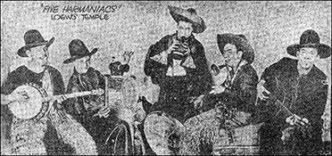Working with a washboard player, I naturally played a lot of Kweskin Jug Band material — “Crazy Words, Crazy Tune,” “Borneo,” “Ukulele Lady,” “Beedle Um Bum,” “I’m Satisfied with My Gal”  (that was a call-and-response with Rob:
(that was a call-and-response with Rob:
“She don’t wear no–”
“Yes, she does!”
“Oh, no, she don’t!”
“Oh, yes, she does!”), and a raft of others, among which this one (from a live recording at the Newport Folk Festival) was a favorite.
When we were playing in Harvard Square a fair number of passersby knew the Jug Band stuff — the Kweskin gang were local heroes and it had only been a dozen years since their heyday — so we often got requests and tried to be ready for them. In Torremolinos we didn’t have a lot of listeners who knew Kweskin’s repertoire specifically, but British skiffle fans were familiar with the style and enjoyed the good-time ragtime rowdiness.
At the time, I had only a vague sense of where the Kweskinites got their material — I knew about the Memphis Jug Band and Cannon’s Jug Stompers, and was aware that they were drawing on a lot of other sources, but in those days before the internet it was not easy to track those sources down. Honestly, I still have no idea where a lot of those songs came from — I’ve never heard anyone else do “Borneo” and the only people I’ve heard singing “Crazy Words, Crazy Tune” (a.k.a. “Washington at Valley Forge”) got it from Kweskin.
“Sadie Green, the Vamp of New Orleans” was in that category until I looked it up on the internet a couple of days ago and found  the Five Harmaniacs, whose 1926 recording was obviously the Kweskin band’s model. What had first attracted me to this particular song was Mel Lyman’s wailing, swinging harmonica break, which turns out to be directly based on the Harmaniacs’ intro, though I still think Lyman’s is better.
the Five Harmaniacs, whose 1926 recording was obviously the Kweskin band’s model. What had first attracted me to this particular song was Mel Lyman’s wailing, swinging harmonica break, which turns out to be directly based on the Harmaniacs’ intro, though I still think Lyman’s is better.
I wasn’t aware of the Harmaniacs, though a few of their recordings appeared on a jug band reissue LP in 1967, and my first assumption was that they were a white band imitating black groups like the Dixieland Jug Blowers and Memphis Jug Band. At some level, that may indeed be the case, but the tradition went a lot further back among both black and white players, and the Harmaniacs were one of the first bands to get it on record.
According to Dave Samuelson, who interviewed three group members:
 Dave noted that they hit right off with “Sadie Green” and went on to record for several labels, while a similar act in this period, Ezra Buzzington’s Rustic Revelers, went on to form the basis of the Hoosier Hot Shots, a very popular novelty band of the 1930s… yet another historical byway to be explored, though not, I think, by me. But I do enjoy playing the song.
Dave noted that they hit right off with “Sadie Green” and went on to record for several labels, while a similar act in this period, Ezra Buzzington’s Rustic Revelers, went on to form the basis of the Hoosier Hot Shots, a very popular novelty band of the 1930s… yet another historical byway to be explored, though not, I think, by me. But I do enjoy playing the song.
